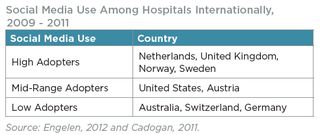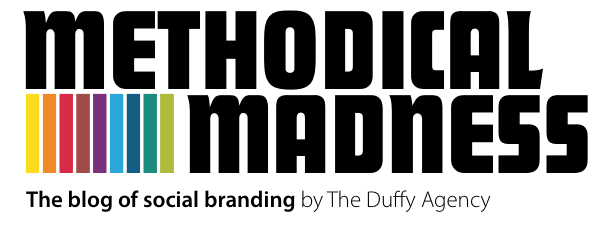Health Care and Social Media
 Wednesday, May 2, 2012 at 12:30PM
Wednesday, May 2, 2012 at 12:30PM A recent article in Information Week stated that the health care community in the United States doesn’t take full advantage of social media as a health care tool. Most healthcare organizations in the U.S. use social media solely for marketing.
In contrast, hospitals in European countries such as the Netherlands, Norway, Sweden, and the United Kingdom are embracing social media as a way to improve care management, engage patients, and communicate with other doctors.

This is somewhat surprising considering the large number of physicans who use social media. A report on social media and physicians found that 90% of physicians use at least one social media site for personal use and 65% use at least one social media site for professional use. Moreover, 20% of clinicians use 2 or more social media sites for personal and professional use.

Many healthcare professionals see social media as a great educational resource for sharing medical knowledge and networking. In fact, there are doctor-only networks such as Sermo, Physician Connect, and Doximity. There are also public groups like TwitterDoctors.net, a database of physicians who tweet, has more than 1,300 doctors registered.
The challenges healthcare professionals face with social media are mostly centered on maintaining patient privacy and complying with industry regulations such as HIPAA where there are severe civil or criminal penalties for disclosing personal information. A report showed that of health care professionals who did not use social media, 70% cited privacy issues as the main deterrant. The American Medical Association has issued guidelines for medical students and physicians. But the social media landscapes moves so quickly, keeping current is difficult.
Medical schools have also tried to tackle the problem of social media, crafting social media policies to help guide students. A report from 2010 showed that out of 132 US medical schools surveyed, 100% had a Web site and 95.45% had some sort of Facebook presence. So, it was surprising to read that only about 10% of these schools had guidelines or policies explicitly mentioning social media. And of these 10% (about 13 schools), only 5 school guidelines stated what is forbidden, inappropriate, or impermissible under any circumstances.
As the Connected Generation sets their sites on careers in healthcare, especially with health care projected to have the fastest job growth between 2010 and 2020, medical schools and other institutes of higher learning are not going to have a choice. This generation expects to be connected at all points in their lives. From a patient point of view, an April survey by the National Research Corporation showed that 20 percent of patients already use social media to gather healthcare information. So it is not a matter of trying to get their patients on social media. They already are there.
What health care workers need are clear policies and training regarding engagement with patients. And while most most would think a patient "friending" a doctor may be a bad idea, the health care industry is going to need to figure out the best way to engage with these social consumers while still remaining compliant.
But what do you think?
How do you see the future of healthcare and social media? What is needed to help encourage participation from both sides?


Reader Comments (1)